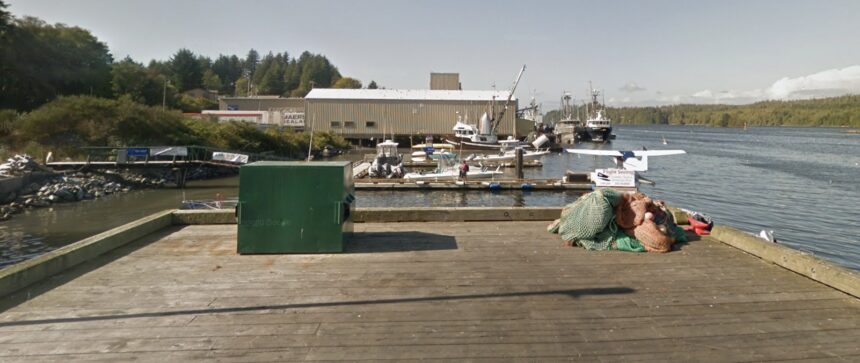In the pale glow of a coastal morning last April, I stood at the edge of Barkley Sound watching a great blue heron stalk through the shallow waters. This intricate ecosystem on Vancouver Island’s west coast, with its maze of islands and protected inlets, has sustained Indigenous communities for thousands of years and now supports a complex web of fishing, tourism, and aquaculture operations.
But beneath the surface, something was wrong.
“We’ve been raising concerns about discharge from the processing plant for years,” Tla-o-qui-aht First Nation fisheries manager Andrew Jackson told me as we looked across the harbor toward the Ucluelet Harbour Seafood processing facility. “Our people have noticed changes in the marine life here, especially in the areas closest to the outflow.”
Those concerns have now been validated. Environment and Climate Change Canada has fined Ucluelet Harbour Seafood $75,000 for violations of the Fisheries Act after the company released untreated fish processing waste into Barkley Sound between January 2022 and March 2023.
The irony isn’t lost on local environmental advocates – a seafood processor damaging the very waters that support their industry. According to federal investigators, the company failed to properly maintain its wastewater treatment system, allowing effluent with excessive biochemical oxygen demand (BOD) and total suspended solids to enter the marine environment.
“Fish processing waste contains high levels of nitrogen and phosphorus,” explains Dr. Sarah Chen, marine ecologist at the University of British Columbia. “When those nutrients enter natural waterways in high concentrations, they can trigger algal blooms that deplete oxygen levels and create dead zones where marine life can’t survive.”
The $75,000 penalty will be directed to the Government of Canada’s Environmental Damages Fund, which supports projects to restore damaged environments. The company has also been added to the Environmental Offenders Registry, a public record of corporations convicted of environmental offenses.
For the coastal communities surrounding Barkley Sound, the fine represents both vindication and frustration. Josh Lewis, a third-generation fisherman from Ucluelet, remembers when the waters were healthier. “My grandfather could predict salmon runs by the clarity of the water and the types of birds you’d see,” he told me as we walked along the harbor. “It’s death by a thousand cuts out here – a little pollution here, some habitat loss there.”
Ucluelet Harbour Seafood processes multiple species including salmon, halibut, sablefish, and hake. The facility, which employs approximately 60 people year-round and up to 150 during peak season, is a significant economic driver in the region.
The company has responded to the fine with a statement indicating they’ve invested over $300,000 in wastewater treatment upgrades. “We take our environmental responsibilities seriously,” said operations manager Teresa Hanna. “The issues identified have been addressed, and we’re implementing additional monitoring systems to ensure full compliance moving forward.”
But for Nuu-chah-nulth First Nations, whose territories encompass Barkley Sound, the damage extends beyond water quality measurements. “This isn’t just about BOD levels or suspended solids,” said Mariah Charleson, Vice President of the Nuu-chah-nulth Tribal Council. “It’s about respecting the waters that have sustained our people since time immemorial. When companies pollute, they’re violating not just environmental regulations but our rights and responsibilities to these places.”
Statistics from Environment and Climate Change Canada show a troubling pattern. Between 2018 and 2024, there have been 27 significant enforcement actions against seafood processing operations across British Columbia, with fines totaling over $2.1 million. Industry experts point to aging infrastructure, seasonal processing surges, and economic pressures as contributing factors.
Dr. Chen’s research indicates that recovery from this type of pollution can take years. “Even after the discharge stops, the accumulated nutrients and disturbance to the ecosystem can persist,” she explains. “The sediment becomes a reservoir of pollution that slowly releases back into the water column.”
Walking along the rocky shoreline near the processing plant, I noticed the subtle signs of stress – fewer intertidal creatures, patches of unusual algae growth, and a faint but persistent odor when the tide was out. These observations align with what local knowledge holders have been reporting.
“Our elders could read these waters like a book,” Jackson told me. “They knew something was wrong long before any testing was done. There’s generations of knowledge there that needs to be respected.”
The fine comes amid growing scrutiny of B.C.’s seafood industry environmental practices. Last year, the provincial government announced enhanced monitoring requirements for aquaculture operations following a series of investigations into sea lice outbreaks at salmon farms. Meanwhile, conservation groups have called for stricter enforcement of existing regulations.
For coastal communities like Ucluelet, balancing economic development with environmental protection remains a complex challenge. The seafood processing sector provides crucial year-round employment in a region heavily dependent on seasonal tourism.
Mayor Marilyn McEwen acknowledged this tension at a recent town council meeting. “We value the jobs and economic activity that seafood processing brings to our community,” she said. “But that can never come at the expense of our marine environment. We need both – healthy waters and sustainable industry.”
As B.C.’s coastal communities face climate change impacts including ocean warming and acidification, protecting water quality becomes increasingly critical. A 2023 report from Fisheries and Oceans Canada indicates that Pacific coastal ecosystems already under stress from pollution are less resilient to climate-related disruptions.
Back at Barkley Sound, as the tide began to rise, I watched kayakers paddle past the processing plant, likely unaware of the invisible struggle playing out in the waters beneath them. The heron I’d spotted earlier had moved on, wading methodically through the shallows in search of its next meal.
The fine against Ucluelet Harbour Seafood represents accountability for past actions, but the true test will be whether it catalyzes lasting change – not just at this facility but across an industry that depends on the very waters it risks contaminating.






